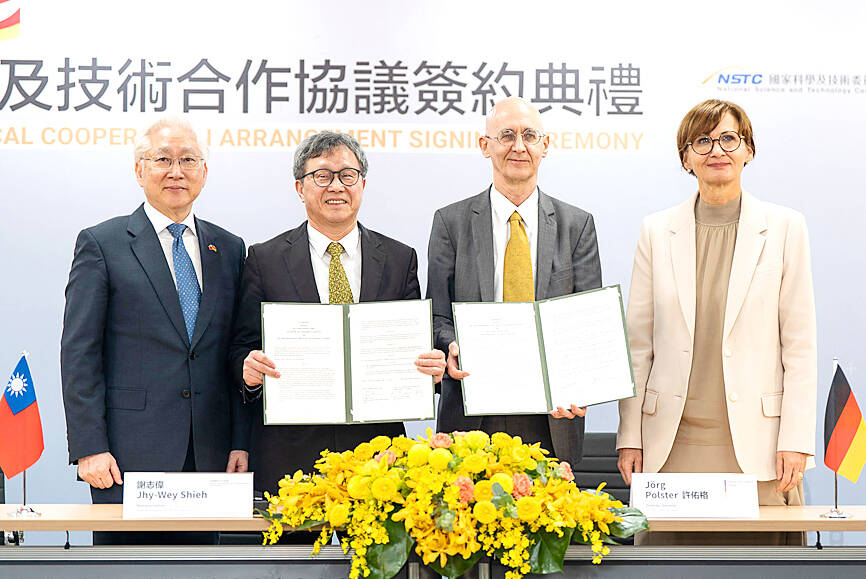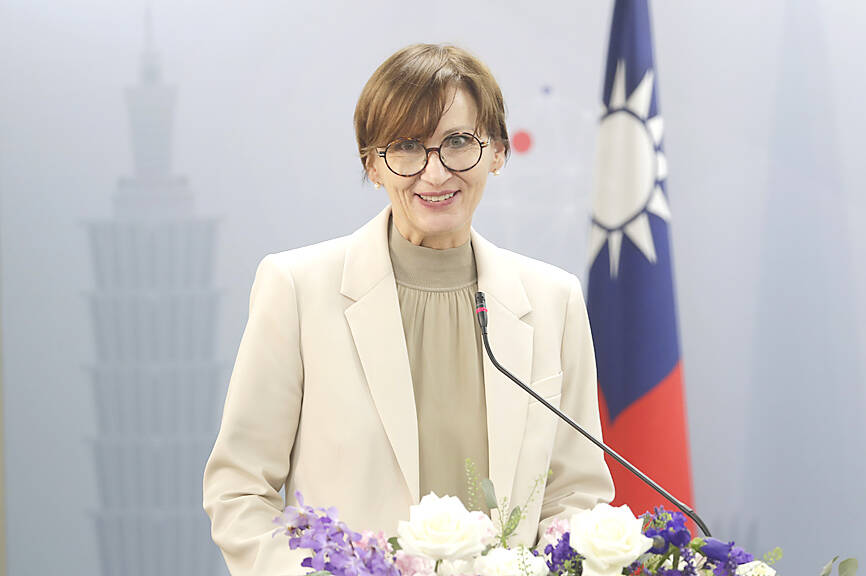Taiwan and Germany yesterday morning inked an agreement on scientific and technological cooperation, with the first German federal Cabinet minister to visit Taiwan in 26 years presiding over the ceremony.
Representative to Germany Shieh Jhy-wey (謝志偉) and German Institute Taipei Director-General Jorg Polster signed the Scientific and Technological Cooperation Agreement (STA) at the National Science and Technology Council in Taipei.
The signing was overseen by German Minister of Education and Research Bettina Stark-Watzinger, who arrived yesterday morning for a two-day visit.

Photo: AFP / National Science and Technology Council
The STA focuses on artificial intelligence, semiconductors, lithium batteries and hydrogen for use in green energy, council Minister Wu Tsung-tsong (吳政忠) said.
It also seeks to cultivate talent, in particular Chinese-language education for German students, he said, adding that it would enable more exchange opportunities for young people.
Wu also hailed the “historic” visit by the German minister, saying that it shows Taiwan is a realiable partner.

Photo: Chiang Ying-ying, AP
When he invited Stark-Watzinger to visit Taiwan during his trip to Germany in November last year, Wu said he never thought she would make it happen within a mere four months.
This shows that Europe — especially Germany — now views Taiwan in a new light, as a free democracy that respects human rights, he said.
Given their strengths in science and technology, Taiwan and Germany complement each other, Wu said.
The STA would set the stage for success, he said, crediting it to the hard work of Taiwan’s 23 million people.
Taiwan is a respected partner in technological research, Stark-Watzinger said, adding that global challenges must be faced together with like-minded countries.
Taiwan and Germany share the values of democracy, transparency, openness and freedom, and have already enjoyed many years of cooperation in various technical fields, she said.
Their complementary technological advantages provide plenty of space for further cooperation, she said.
The new STA would pave the way for more extensive cooperation in economic innovation and high-tech research to the benefit of both sides, she added.
Stark-Watzinger is the first German Cabinet minister to visit Taiwan in 26 years, following a visit by then-German minister of economics Gunter Rexrodt in 1997.
Yesterday afternoon, Stark-Watzinger led her delegation of 14 to visit National Taiwan University.
The delegation is to visit the Siemens training center at Nangang Vocational High School in Taipei this morning, and later meet with Minister of Education Pan Wen-chung (潘文忠) to exchange views on Chinese-language education and semiconductor academies.
In the afternoon, they are to visit the Taiwan Semiconductor Research Institute in Hsinchu before leaving for the airport.

CHAOS: Iranians took to the streets playing celebratory music after reports of Khamenei’s death on Saturday, while mourners also gathered in Tehran yesterday Iranian Supreme Leader Ayatollah Ali Khamenei was killed in a major attack on Iran launched by Israel and the US, throwing the future of the Islamic republic into doubt and raising the risk of regional instability. Iranian state television and the state-run IRNA news agency announced the 86-year-old’s death early yesterday. US President Donald Trump said it gave Iranians their “greatest chance” to “take back” their country. The announcements came after a joint US and Israeli aerial bombardment that targeted Iranian military and governmental sites. Trump said the “heavy and pinpoint bombing” would continue through the week or as long

TRUST: The KMT said it respected the US’ timing and considerations, and hoped it would continue to honor its commitments to helping Taiwan bolster its defenses and deterrence US President Donald Trump is delaying a multibillion-dollar arms sale to Taiwan to ensure his visit to Beijing is successful, a New York Times report said. The weapons sales package has stalled in the US Department of State, the report said, citing US officials it did not identify. The White House has told agencies not to push forward ahead of Trump’s meeting with Chinese President Xi Jinping (習近平), it said. The two last month held a phone call to discuss trade and geopolitical flashpoints ahead of the summit. Xi raised the Taiwan issue and urged the US to handle arms sales to

State-run CPC Corp, Taiwan (CPC, 台灣中油) yesterday said that it had confirmed on Saturday night with its liquefied natural gas (LNG) and crude oil suppliers that shipments are proceeding as scheduled and that domestic supplies remain unaffected. The CPC yesterday announced the gasoline and diesel prices will rise by NT$0.2 and NT$0.4 per liter, respectively, starting Monday, citing Middle East tensions and blizzards in the eastern United States. CPC also iterated it has been reducing the proportion of crude oil imports from the Middle East and diversifying its supply sources in the past few years in response to geopolitical risks, expanding

Pro-democracy media tycoon Jimmy Lai’s (黎智英) fraud conviction and prison sentence were yesterday overturned by a Hong Kong court, in a surprise legal decision that comes soon after Lai was jailed for 20 years on a separate national security charge. Judges Jeremy Poon (潘兆初), Anthea Pang (彭寶琴) and Derek Pang (彭偉昌) said in the judgement that they allowed the appeal from Lai, and another defendant in the case, to proceed, as a lower court judge had “erred.” “The Court of Appeal gave them leave to appeal against their conviction, allowed their appeals, quashed the convictions and set aside the sentences,” the judges